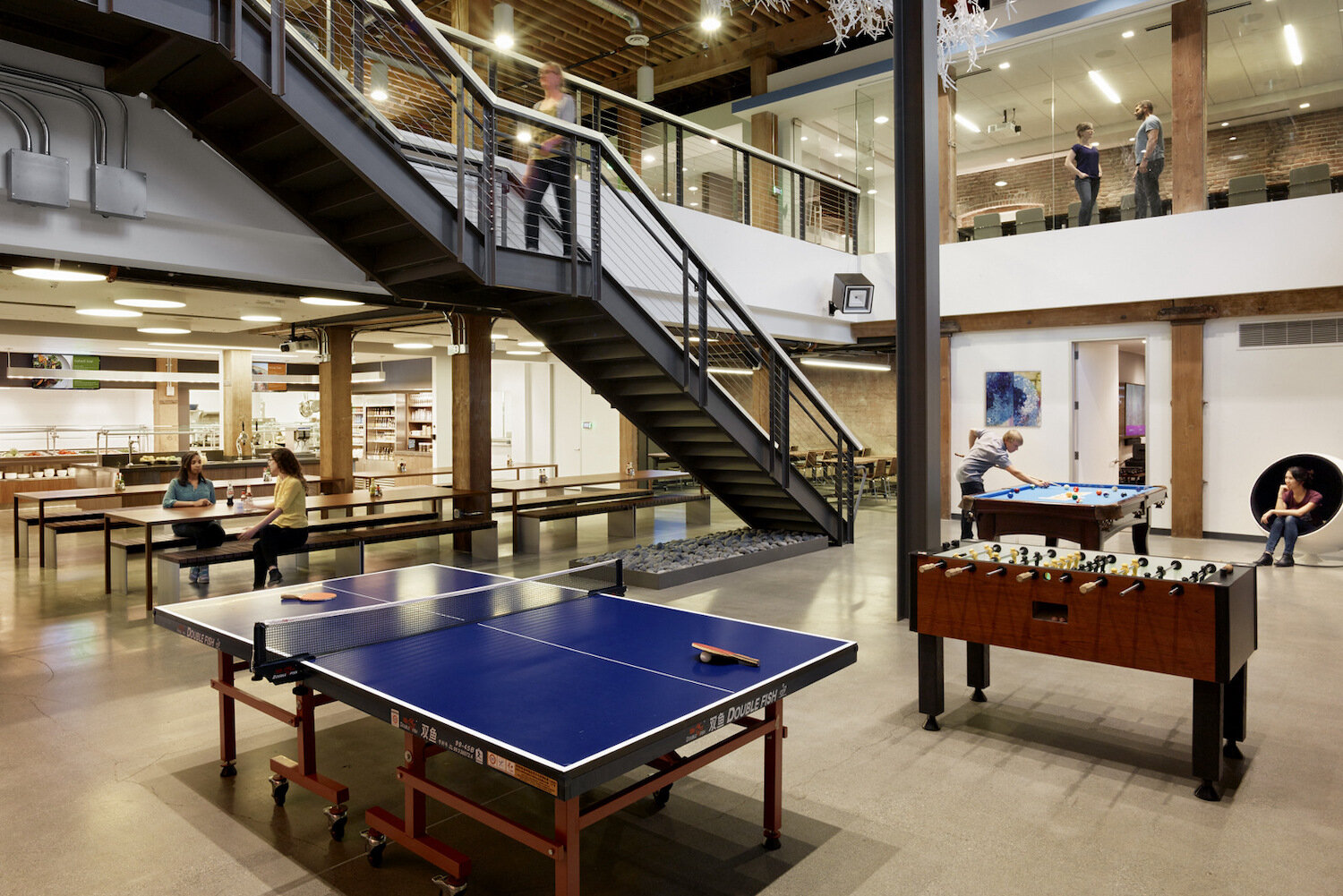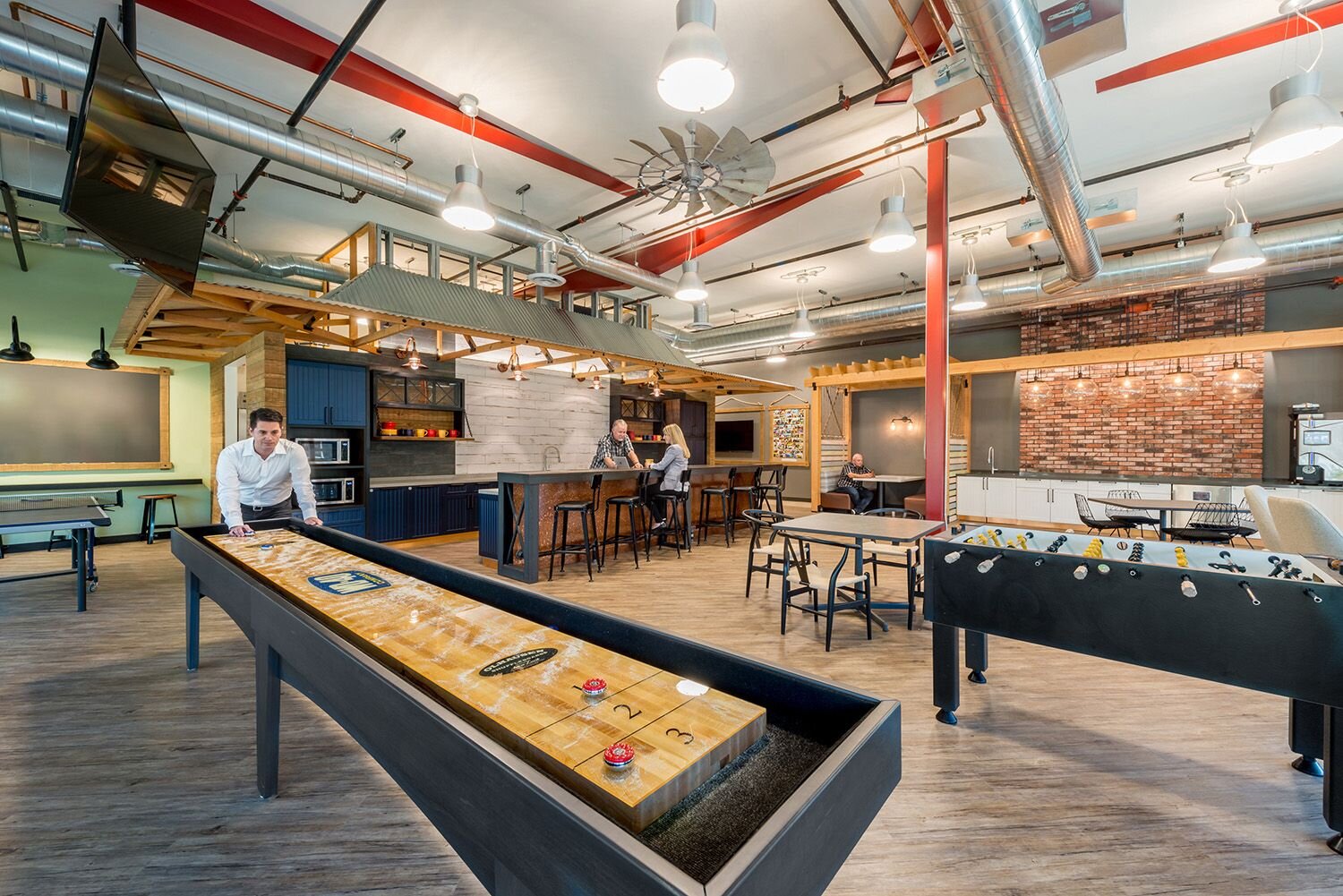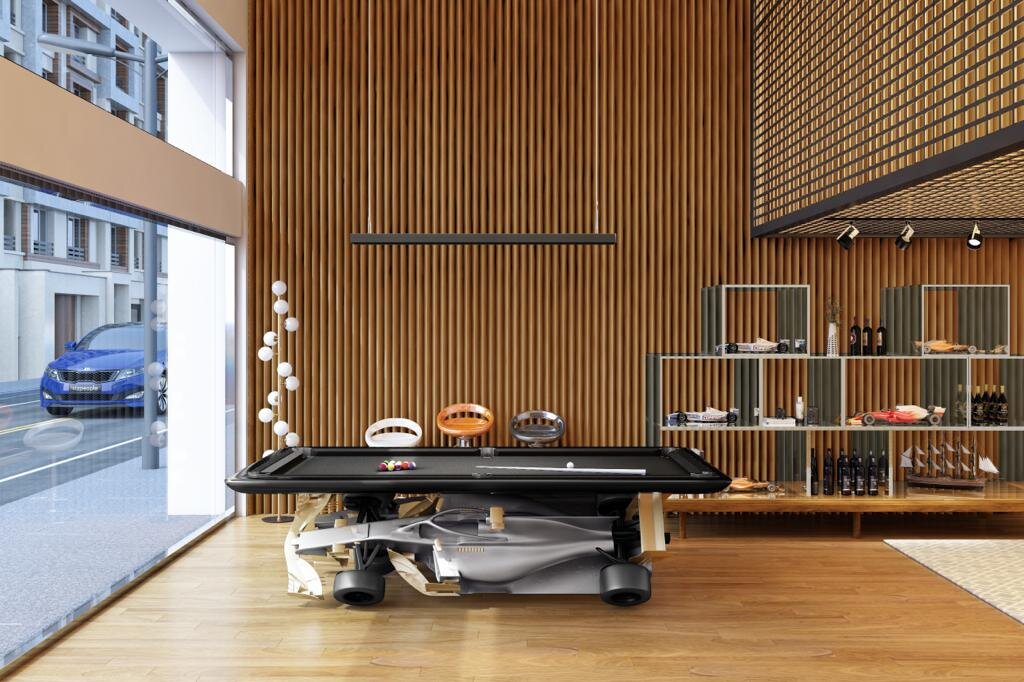Using Play to Improve Productivity
Discover the surprising ways play can boost your productivity and improve your work.
Grubhub’s game room in their Chicago headquarters.
We often associate a game of pool as something to do at the local pub—an enjoyable pastime with friends. Whether it's foosball, shuffleboard, poker, or fantasy role-playing games, play is seen as something to enjoy in our free time once we've completed our responsibilities. The activities are seen as rewards. As adults, we have become conditioned to believe that we must first work hard and then we can play hard later.
This belief that play is a reward for hard work most likely stems from cultural and historical views. However, it's important to recognize the growing amount of research suggesting that this mindset might be misguided and that not only can play have physical and cognitive benefits but that it can also help us to work better.
No time to play, “I'm too busy working.”
These four words are said quite often by workers around the world. This is especially true in today's economy, where many have to take a second job or join the “gig economy” to make ends meet. People are simply too busy worrying about having to work rather than thinking about how play may contribute to their productivity, let alone their happiness.
This thinking likely has roots in the Protestant work ethic, which emphasized hard work and diligence as virtues. This mindset was popularized in the 16th and 17th centuries and has had a lasting impact on Western cultures. According to the author and psychiatrist Stuart Brown, the Protestant work ethic “glorifies work as the central purpose of life and the means to achieve success and merit.”
In his book Play: How It Shapes the Brain, Opens the Imagination, and Invigorates the Soul, Brown writes, “The Protestant work ethic that swept the Western world in the seventeenth century, and that still pervades our culture, has relegated play to the sphere of leisure, making it something we do after we have finished our work or on weekends.”
However, increasingly, research suggests that this emphasis on work over play may need to be revised. It shows that play improves productivity and helps us work better, but it can also reduce stress, foster creativity, build problem-solving skills, and strengthen interpersonal relationships.


What Makes Play So Powerful?
For one, play can help reduce stress and increase happiness and well-being. When employees feel burnt out or overwhelmed, it can be challenging for them to focus and be productive. Taking a break to engage in leisure activities can clear their minds and give them a much-needed mental break.
One study found that employees who took time for play, such as hobbies and sports, were more likely to have higher job satisfaction and productivity. In an article for Forbes, contributor Glenn Llopis writes, "Incorporating play into the workplace can lead to increased creativity, productivity, and overall employee engagement."
When one plays (see the Importance of Play), they put their worries away and lose themselves in the positive feelings play provides. These positive emotions are generated by 'happy hormones' or endorphins rushing through our bodies. They help us relax, lift our moods, and ultimately produce a greater sense of well-being throughout our body and mind.
Play can also foster creativity and problem-solving skills. When we play, we often face new challenges and obstacles that require us to think outside the box and develop creative solutions. These skills can then be applied to work-related tasks, helping us to approach problems with a fresh perspective.
Finally, play can help to build strong relationships and foster a positive work culture. When we take the time to play and have fun with our colleagues, we develop stronger bonds and a greater sense of community. This can lead to increased collaboration and teamwork, which are essential for success in the modern workplace.


Every Workplace Should Have A Dedicated Place For Play
Rather than being left as a reward for hard work—and something we do after work—we should start viewing play as both an additive and a stimulus to better productivity. Play has the power to become the oil that greases the wheels of productivity. It can be a lubricant for employees looking for sparks of creativity and innovation.
As a result, in recent years, more and more companies have been adding game rooms and other dedicated areas for play to their headquarters. These spaces are often equipped with video games, board games, ping pong tables, and other leisure activities that employees can enjoy during breaks or throughout the day.
Many companies are creating these spaces to promote a better work-life balance and encourage employees to take breaks and relax during the work day. In an article for Fast Company, contributor Ben Paynter writes, “[p]lay is becoming an increasingly important part of the office, as companies look to boost productivity by giving employees a place to relax and recharge.”
Companies are adding all types of dedicated areas for play to their offices. Here are a few examples of companies that have incorporated game rooms into their workplace:
Tech giant Google has game rooms, nap pods, and other relaxation areas at its headquarters.
Global accounting firm Deloitte has a game room at its Toronto office that includes a foosball table, pool table, and other leisure activities.
Advertising agency Leo Burnett has a game room at its Chicago headquarters that includes a ping pong table, shuffleboard, and other recreational activities.
Consulting firm Bain & Company has a game room at its Boston office that includes a pool table, ping pong table, and other leisure activities.
Law firm Latham & Watkins has a game room at its Los Angeles office that includes a foosball table, pool table, and other recreational activities.
Increasingly companies are understanding the value of play in the workplace. This will become even more important as workplaces evolve after the COVID-19 pandemic. With many in the workforce choosing to continue to work remotely, companies are finding ways to transform their offices to adapt to these changing realities. This includes dedicated areas for play.
So, the next time you're feeling overwhelmed and unproductive, consider taking a break to engage in a leisure activity. Whether playing a game of foosball, putting together a puzzle, or simply taking a turn at Monopoly, incorporating play into your daily routine can significantly impact your productivity and well-being.
Own a company, why not invest in a custom-built game table (e.g., pool, foosball, shuffleboard, table tennis, air hockey, etc.), and schedule an appointment with Billiards by Brandt to explore the possibilities?
#####
Note: Any photographs and designs depicted on this website not owned by Billiards by Brandt are the property of their respective owners. Their usage on this website is intended for informational and educational purposes.
References:
Brown, Stuart. Play: How It Shapes the Brain, Opens the Imagination, and Invigorates the Soul. Avery; 2009.
Llopis, Glenn. "The Surprising Benefits Of Incorporating Play Into The Workplace." Forbes, Forbes Magazine; 15 Feb. 2017.
Paynter, Ben. "Why Play Is an Increasingly Important Part of the Office." Fast Company, Fast Company; 26 Jan. 2016.
